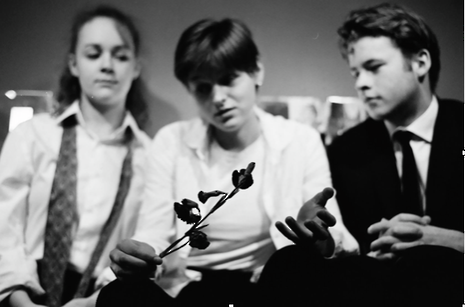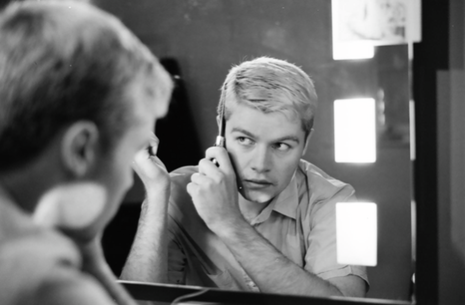All together now: working with an ensemble in Mojo
Artistic Directors Emma Corrin and Harry Redding reflect on Mojo and the process of putting on an ensemble production in Cambridge for the first time

Having seen Ian Rickson’s version of Mojo with its star-studded cast at the Harold Pinter Theatre in 2013, we were both blown away by the charisma, energy, and power of the play. The music was aggressive; the play was visceral and didn’t allow you to stop for breath. This stuck with us for a long time.
Mojo is blackly comic, filled with electric dialogue, a claustrophobic atmosphere, and a sense of mounting chaos. It explores the darker days of 1950s Soho where drugs, gang warfare, and backstreet deals reigned amongst a psychedelic climate of clubs, pubs, and parties. The audience is sucked into an imposingly masculine atmosphere, but as the group dynamics, character flaws, and plot are delved into, we learn that these men are emotionally damaged and raw.
“Mojo is blackly comic, filled with electric dialogue, a claustrophobic atmosphere and a sense of mounting chaos”
We had a sense of what we wanted the show to be like, but neither of us had directed a show ourselves before. In the world of Cambridge Theatre, as a process, ensemble work is out of the ordinary, so we didn’t know how our rehearsal ideas would be received. Once we found out that we had been successful, we started gathering others to join our ensemble. We have been extremely lucky to work with the talents that are Sophie Taylor, Sabian Phippen, Ben Clarke, and Christian Hines. Ensemble work is as rewarding as it is challenging. A cast of individuals who are completely in tune with one another is paramount, so finding this has been totally worthwhile.

Another key aspect which differentiates our version of Mojo is the choice to cast two female parts in two male roles, without changing the text in terms of pronouns or names. It has not been ‘gender swapping’ as such, but it has been more of a choice to play primarily the character as opposed to the gender. This decision initially began when I [Emma] felt drawn to the character ‘Baby’, felt I could play the role and didn’t see gender as an obstacle. We rolled with this idea for a while, choosing also to swap Potts, and found that this uncovered several interesting questions regarding masculinity and sexuality - themes very much at the play’s core. In 2013, Ben Whishaw played Baby androgynously, but in casting a woman to play such a character, we found boundaries of masculinity and femininity blurring in a way that effectively serves the play, drawing attention to the critique of masculinity so central to Mojo.
We also had the assistance of four incredible associate directors, who are just as passionate about Mojo as we are. They were present at some of our rehearsals over the course of the process, reviewing what we had done. This provided us with alternative ways of viewing scenes, and a chance to question our characters further. We also are extremely excited to have a live band, The Nails (Tiernan Banks, Dom Christie, Joscelin Dent-Pooley and Patrick Fitzgerald), who will be playing music they have written exclusively for the play. Influenced by Jez Butterworth’s writing, the music will crucially draw the play’s seedy Soho club atmosphere to the ADC stage. Harry and I were keen to collaboratively involve the full production team throughout the rehearsal process. We think this shared vision will come across in the various elements of the production.
It’s been a refreshing way to approach a text, and we feel incredibly fortunate to be working with such a tremendous play. The collaborative nature of it all has felt totally unique – both with the ensemble and the production team – and we are proud of the final piece we have created; we hope that the audience will enjoy Mojo as much as we have.
Mojo runs at the ADC from the 9th-13th of May at 7:45pm
 News / Hundreds of Cambridge academics demand vote on fate of vet course20 February 2026
News / Hundreds of Cambridge academics demand vote on fate of vet course20 February 2026 News / University Council rescinds University Centre membership20 February 2026
News / University Council rescinds University Centre membership20 February 2026 News / Judge Business School advisor resigns over Epstein and Andrew links18 February 2026
News / Judge Business School advisor resigns over Epstein and Andrew links18 February 2026 News / Petition demands University reverse decision on vegan menu20 February 2026
News / Petition demands University reverse decision on vegan menu20 February 2026 News / Caius students fail to pass Pride flag proposal20 February 2026
News / Caius students fail to pass Pride flag proposal20 February 2026








